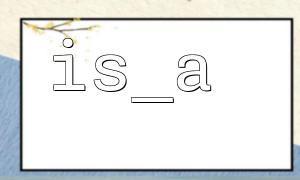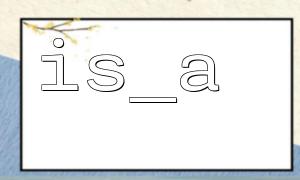When building interfaces or processing data in PHP, checking parameter types is a key step to ensure system stability and security. PHP is a dynamic typed language that only judges the type of variables at runtime. Therefore, in some key scenarios, developers need to explicitly check the type of parameters. The is_a() function is a tool we use frequently, especially in object-oriented programming, which can effectively determine whether an object is an instance of a certain class or an instance of its subclass.
is_a() is a built-in function provided by PHP, which is used to determine whether an object belongs to a certain class or is a subclass of that class. Its function prototype is as follows:
bool is_a(object|string $object_or_class, string $class, bool $allow_string = false)
$object_or_class : The object or class name (string) to be judged.
$class : Target class name.
$allow_string : If set to true and $object_or_class is a string, judgment is allowed by class name string.
Let's learn how to use is_a() with a simple example:
class Animal {}
class Dog extends Animal {}
$dog = new Dog();
if (is_a($dog, 'Animal')) {
echo "This is a Animal Objects of a type or subclass。";
}
Output:
This is a Animal Objects of a type or subclass。
This example shows that is_a() can not only determine whether an object is an instance of a specified class, but also determine whether it is a subclass of that class.
In API interfaces, especially when receiving external input data, we cannot assume that the incoming parameter type always meets expectations. For example, when dealing with policy patterns, dependency injection, or callback mechanisms, we may expect that a parameter must implement a certain interface or inherit a certain base class.
Suppose we have an interface for exporting functions:
interface Exporter {
public function export(array $data): string;
}
class JsonExporter implements Exporter {
public function export(array $data): string {
return json_encode($data);
}
}
function handleExport($exporter, array $data) {
if (!is_a($exporter, 'Exporter')) {
throw new InvalidArgumentException("Parameters must be implemented Exporter interface");
}
echo $exporter->export($data);
}
Here we use is_a() to ensure that the incoming $exporter parameter does implement the Exporter interface, thereby avoiding system crashes or outputs that do not meet expectations due to type errors.
Although PHP 7+ provides type prompting functionality, you can declare parameter types directly in function signatures, for example:
function handleExport(Exporter $exporter, array $data) {
echo $exporter->export($data);
}
However, in some dynamic calls (such as getting objects from containers, reflecting calling methods, etc.), type prompts cannot fully guarantee type safety. It is still very necessary to use is_a() for manual checking.
Consider a scenario: we have developed an interface for uploading images, and we need to return a URL after uploading. We define an Uploader interface and call the corresponding upload class according to the type.
interface Uploader {
public function upload(string $filePath): string;
}
class ImageUploader implements Uploader {
public function upload(string $filePath): string {
// pseudocode:Simulate file upload
return 'https://m66.net/uploads/' . basename($filePath);
}
}
function handleUpload($uploader, string $filePath) {
if (!is_a($uploader, 'Uploader')) {
throw new InvalidArgumentException("Invalid uploader type");
}
$url = $uploader->upload($filePath);
echo "File uploaded,Access address:$url";
}
In this way, we can not only ensure that the type of the uploader object is in line with expectations, but also build a more stable and scalable upload system.
is_a() is a powerful tool for judging object types in PHP, especially in complex systems. With the help of it, our interface can be more robust, flexible and secure. Although modern PHP supports type prompts and automatic loading, is_a() still plays an irreplaceable role when dealing with non-explicit dependencies, runtime injection, plug-in architecture and other scenarios. Developing the habit of manually judging object types in key logic will provide a solid layer of guarantee for the quality of your code.
Related Tags:
API












